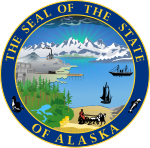
Frank Hughes Murkowski is an American politician. A member of the Republican Party, he served as a United States Senator representing Alaska from 1981 to 2002 and as the eighth governor of Alaska from 2002 to 2006.

Lisa Ann Murkowski is an American attorney and politician serving as the senior United States senator from Alaska, having held the seat since 2002. She is the first woman to represent Alaska in the Senate and is the Senate's second-most senior Republican woman. Murkowski became dean of Alaska's congressional delegation upon Representative Don Young's death.

Mark Peter Begich is an American politician and lobbyist who served as a United States senator from Alaska from 2009 to 2015. A member of the Democratic Party, he served as mayor of Anchorage from 2003 to 2009.
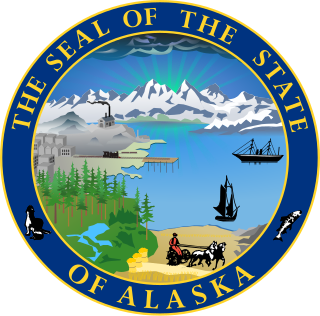
The number of elections in Alaska varies by year, but typically municipal elections occur every year, plus primary and general elections for federal and state offices occur during even-numbered years. Alaska has a gubernatorial election every four years. Members of the state's United States congressional delegation run for election or re-election at the times set out in the United States Constitution. Primary elections assist in choosing political parties' nominees for various positions. On a regional basis, elections also cover municipal issues. In addition, a special election can occur at any time.
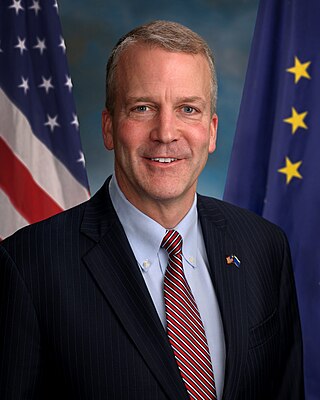
Daniel Scott Sullivan is an American politician and attorney serving as the junior United States senator from Alaska since 2015. A member of the Republican Party, Sullivan previously served as the commissioner of the Alaska Department of Natural Resources from 2010 to 2013, and as the Alaska Attorney General from 2009 to 2010.

The 2014 United States Senate election in Alaska took place on November 4, 2014, to elect a member of the United States Senate to represent the State of Alaska, concurrently with the election of the governor of Alaska, as well as other elections to the United States Senate in other states and elections to the United States House of Representatives and various state and local elections.
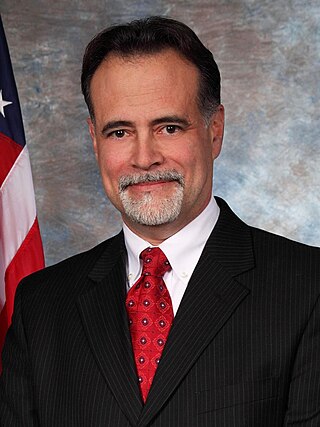
Peter A. Micciche is an American politician and a Republican member of the Alaska Senate since January 15, 2013, and before January 13, 2023 representing District O. Micciche was previously the mayor of Soldotna, Alaska, and a member of its city council.

Michael James Dunleavy is an American educator and politician serving since 2018 as the 12th governor of Alaska. A Republican, he was a member of the Alaska Senate from 2013 to 2018. He defeated former U.S. senator Mark Begich in the 2018 gubernatorial election after incumbent governor Bill Walker dropped out of the race. He was reelected in 2022.
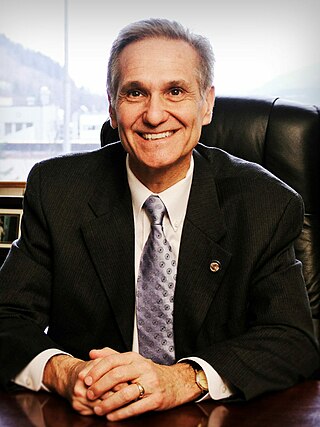
Kevin Gerald Meyer is an American politician who served as the 14th lieutenant governor of Alaska from 2018 to 2022. He was a Republican member of the Alaska Senate from January 20, 2009 to December 3, 2018, representing District M. He was president of the Alaska Senate, leading a caucus of 14 Republicans and 1 Democrat from 2015 to 2017. Meyer served in the Alaska Legislature continuously from 2003 to 2018, in both the Alaska House of Representatives and Senate, previously representing the district when it was District O. He works as an investment recovery coordinator for ConocoPhillips.

The 2016 United States Senate election in Alaska was held on November 8, 2016, to elect a member of the United States Senate to represent the State of Alaska, concurrently with the 2016 U.S. presidential election, as well as other elections to the United States Senate in other states and elections to the United States House of Representatives and various state and local elections.

The 2020 United States Senate election in Alaska was held on November 3, 2020, to elect a member of the United States Senate to represent the State of Alaska, concurrently with the nationwide presidential election, as well as other elections to the United States Senate, elections to the United States House of Representatives, and various state and local elections. Incumbent Republican Senator Dan Sullivan won re-election to a second term in office, defeating Democratic nominee Al Gross, the son of Avrum Gross, who ran as an independent candidate. John Wayne Howe, the nominee of the Alaskan Independence Party, was also on the ballot and finished a distant third.

The 2022 United States Senate election in Alaska was held on November 8, 2022. Incumbent Republican senator Lisa Murkowski won reelection to a fourth full term, defeating fellow Republican Kelly Tshibaka and Democrat Patricia Chesbro.

The 2018 United States House of Representatives election in Alaska were held on November 6, 2018, to elect the U.S. representative from Alaska's at-large congressional district, who would represent the state of Alaska in the 116th United States Congress. The election coincided with other elections to the House of Representatives, as well as elections to the United States Senate and various state and local elections.

The 2018 Alaska House of Representatives election were held on Tuesday, November 6, 2018, with the primary election on August 21, 2018. Voters in the 40 districts of the Alaska House of Representatives elected their representatives. The elections coincided with the elections for other state offices, including the gubernatorial election and the state senate elections. While Republicans gained a nominal majority in the chamber, when the new House convened in 2019, Democratic members formed a coalition with independents and dissident Republicans to re-elect Bryce Edgmon as speaker.

The 2022 Alaska gubernatorial election was held on Tuesday November 8, 2022, to elect the governor of Alaska. Incumbent Republican governor Mike Dunleavy won re-election to a second term, becoming the first Republican governor to be re-elected to a second term since Jay Hammond in 1978 and the first governor, regardless of political affiliation, to be re-elected to a second term since Tony Knowles in 1998.

The 2020 Alaska Senate elections took place as part of the biennial 2020 United States elections. Voters in Alaska elected state senators in 11 of the state's 20 senate districts – the usual ten plus one special election. State senators serve four-year terms in the Alaska Senate, with half seats up for election every two years. Primary elections on August 18, 2020, determined which candidates appeared on the general election ballot on November 3, 2020.

The 2022 Alaska House of Representatives elections were held on Tuesday, November 8, 2022, with the primary election on August 16, 2022. Voters in the 40 districts of the Alaska House of Representatives elected their representatives, in conjunction with state senate elections and the biennial United States elections for federal offices.

The 2022 Alaska Senate elections took place on November 8, 2022, with the primary elections being held on August 16, 2022. State senators serve four-year terms in the Alaska Senate, with half of the seats normally up for election every two years. However, because most districts were greatly changed in redistricting, elections were held for 19 of the 20 seats; the only exception is District T, represented by Democrat Donny Olson, which was mostly unchanged in redistricting and thus did not have an election. Some senators were elected to serve four-year terms, while others would serve shortened two-year terms.

The 2022 Alaska state elections took place on November 8, 2022. The state also held Regional Educational Attendance Area (REAA) elections on the first Tuesday in October.

